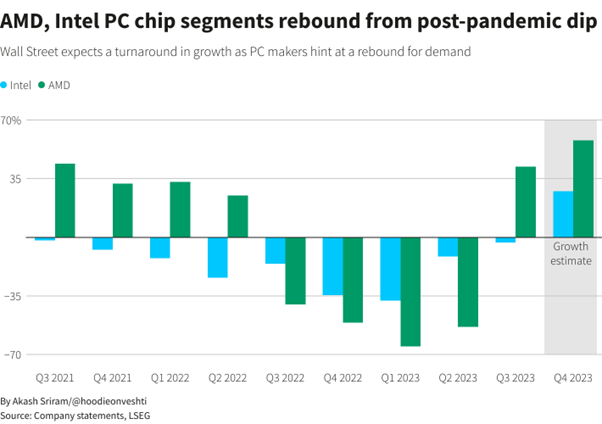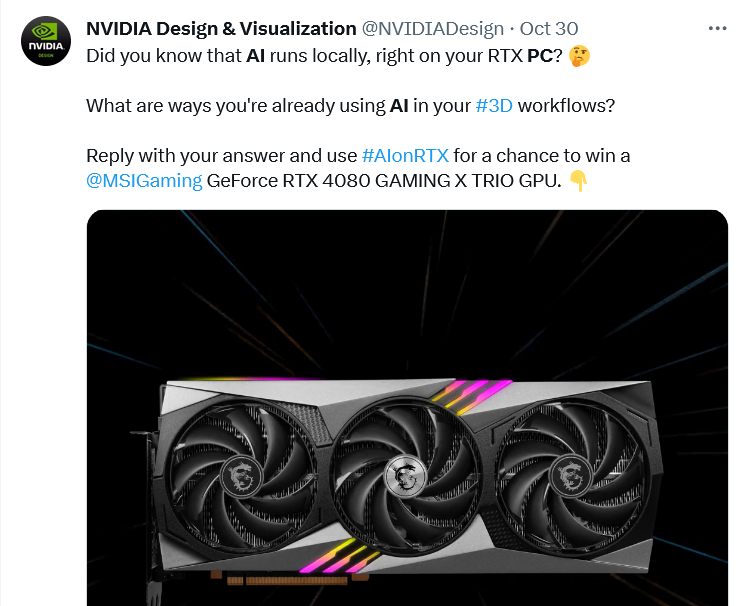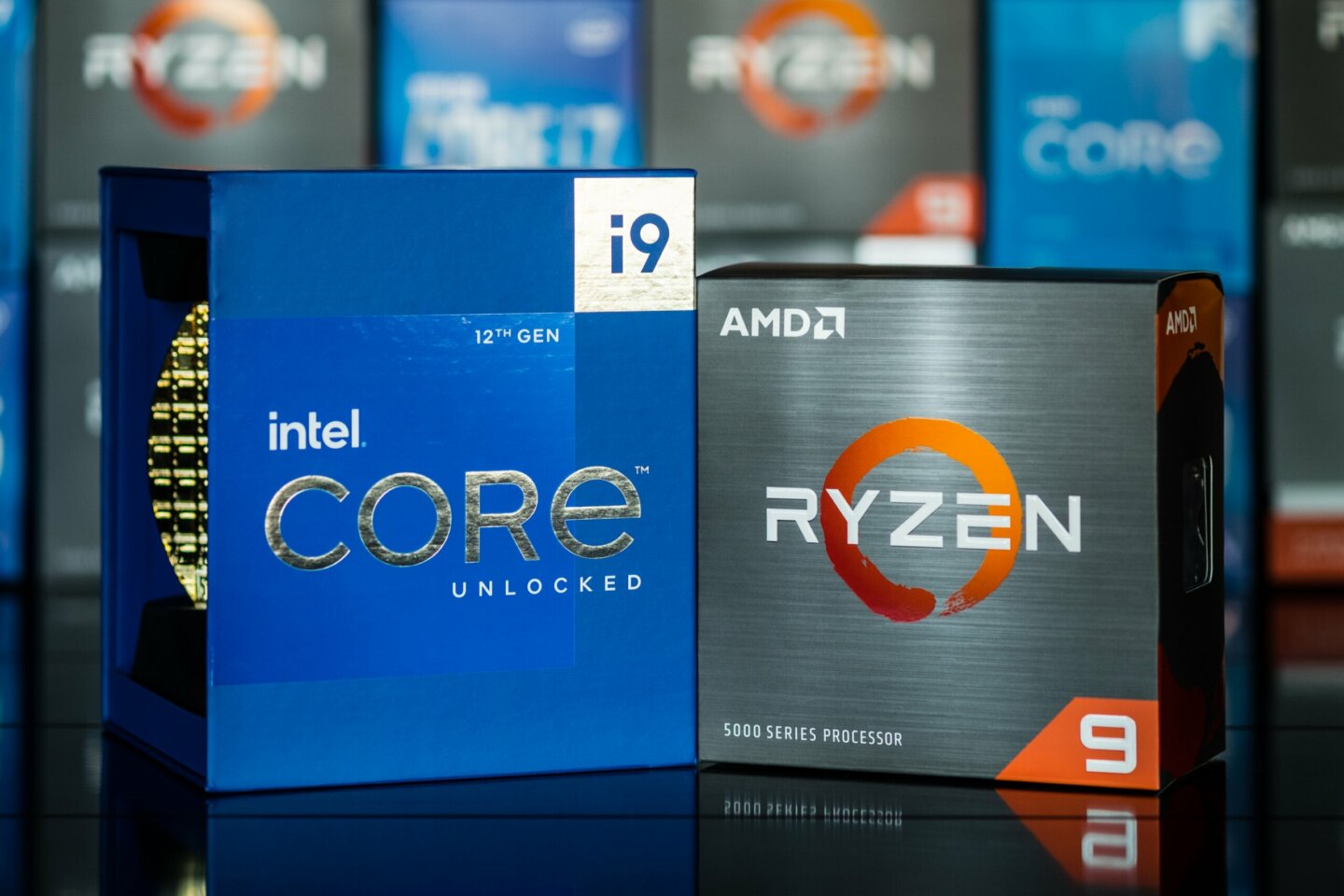The emergence of artificial intelligence in the personal computing industry. (Source – Shutterstock)
- Artificial intelligence-enabled PCs are an important milestone in personal computing, led by Intel and AMD.
- AMD’s strong performance heralds an AI-driven era of PC innovation.
- Artificial intelligence PC seems to be in our near future.
As we stand on the cusp of a technological renaissance, the personal computer industry, once considered stagnant, is experiencing a revival of fortune and innovation. Intel and AMD, leaders in this sector, not only represent a strong recovery in the PC market, but are also leading the charge into a bold new era marked by the rise of artificial intelligence in personal computing.
This rejuvenation, hinted at by their recent earnings, is more than a fleeting comeback. It promises a transformative change in the way we interact with technology.
At the heart of this resurgence are insights shared by Intel CEO Pat Gelsinger and AMD CEO Lisa Sue. Both visionaries emphasize the stability of the PC market and foresee the integration of artificial intelligence as a major catalyst for growth. The concept of AI-powered PC machines equipped with advanced chips capable of running large-language models and applications represents a paradigm shift from cloud-based computing to local AI computing.
This leap forward not only promises improved performance and capabilities, but also opens the door to a host of innovations previously thought impractical in the PC environment.
AMD and Intel’s vision for artificial intelligence in personal computing
“The arrival of artificial intelligence computers represents a turning point in the PC industry,” said Intel CEO Pat Gelsinger. AMD’s Lisa Sue predicts growth through 2024, aligning it with the cycle of new AI PCs and upcoming updates to Microsoft’s Windows.
Artificial intelligence-enabled personal computers, integrated with sophisticated processors capable of autonomously executing large-scale language models and applications, are moving away from traditional cloud dependence. This advancement in AI PCs is particularly highlighted in Intel’s recent AI PC Acceleration Program.
ReutersIn the most recent quarter, AMD’s PC-focused division posted its best performance in two years, while Intel’s PC division experienced its slowest revenue decline in eight quarters, it reported.
Justin Sumner, senior portfolio manager at Voya Investment Management and an investor in AMD and Intel, saw a significant increase in PC demand attributed to various factors caused by the pandemic, such as remote work.
“We’re finally seeing that trend taper off,” Sumner noted. This should lead to normal inventory replenishment and improvement in the market.”

A chart shows that AMD and Intel chip segments have recovered after post-pandemic declines. (Source – Reuters)
PC manufacturers have been actively reducing inventories in anticipation of increased demand during the holiday season and in anticipation of Microsoft’s upcoming Windows update next year.
Market research from organizations such as Canalys reinforces these predictions. After a moderate decline in global PC sales in the third quarter, Canalys predicts a return to growth in the market during the expected holiday season. They predict that AI-enabled PCs will gain rapid adoption from 2025 and expect them to account for approximately 60% of all PC shipments by 2027.
However, some investors point to a lack of AI applications as a potential barrier to widespread adoption. Currently, Microsoft is the only major player to offer such technology with genAI-powered Copilot software launched for Microsoft 365 enterprise customers.
“It’s not clear to us yet that there’s a ‘killer app’ that’s driving this upgrade cycle,” said Dave Egan, senior research analyst at Columbia Threadneedle and an investor in AMD and Intel.
Dell Technologies and Meta partner with Llama 2 for on-site generative AI
Adding another layer to the AI narrative is the recent collaboration between Dell Technologies and Meta. The partnership aims to simplify the deployment of Llama 2 meta-models in Dell customer environments through Dell’s comprehensive AI infrastructure that spans IT hardware, client devices and professional services.
Chris Kelly, senior vice president of data center sales at Dell Technologies for Asia Pacific and Japan, noted that this integration allows for the widespread deployment of generative AI across multiple locations, with many businesses considering on-premise implementations with factors such as privacy in mind. Data privacy, security, preferred. and the impact of data gravity
“Integrating Llama 2’s meta-models into Dell’s Generative AI portfolio will help organizations accelerate their digital transformation and enhance the way they interact with customers, employees and the market more broadly to turn valuable insights into action,” Kelly added. “

Deploying Llama 2 meta AI models in place. (Source – Shutterstock)
The partnership makes it easy to implement on-premises AI by integrating Dell’s leading infrastructure suite with Llama 2’s meta AI models. This allows customers to accelerate their GenAI projects in traditional data centers or edge locations. Dell’s integration of Llama 2 meta models into system configuration tools helps customers select optimal solutions for AI-based initiatives.
Featuring Meta’s Llama 2, Dell Validated Design for Generative AI provides a comprehensive package of proven Dell infrastructure, software and services that simplify the deployment and management of on-premise projects. Detailed setup and configuration guidance allows organizations to quickly build and predictably operate their GenAI infrastructure.
By combining Meta’s Llama 2 with Dell’s AI Generative Solutions technology and services, organizations of all sizes can access powerful tools that facilitate the delivery of GenAI solutions from personal desktop environments to core data centers, edge locations and public clouds.

All the big players are focused on local AI.
#Intel #AMD #artificial #intelligence #PCs
Image Source : techwireasia.com

